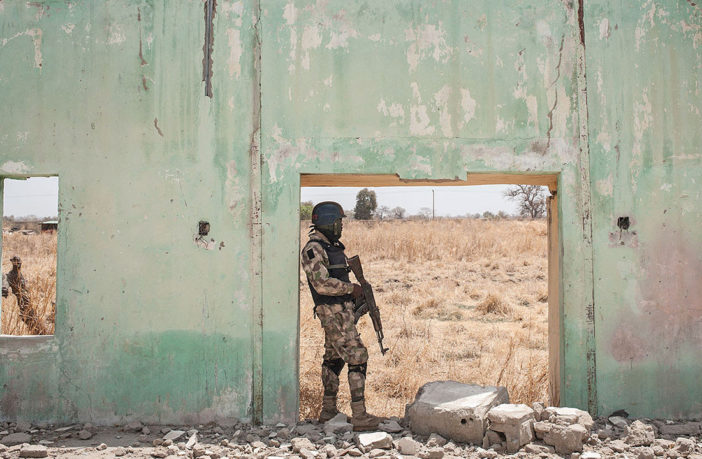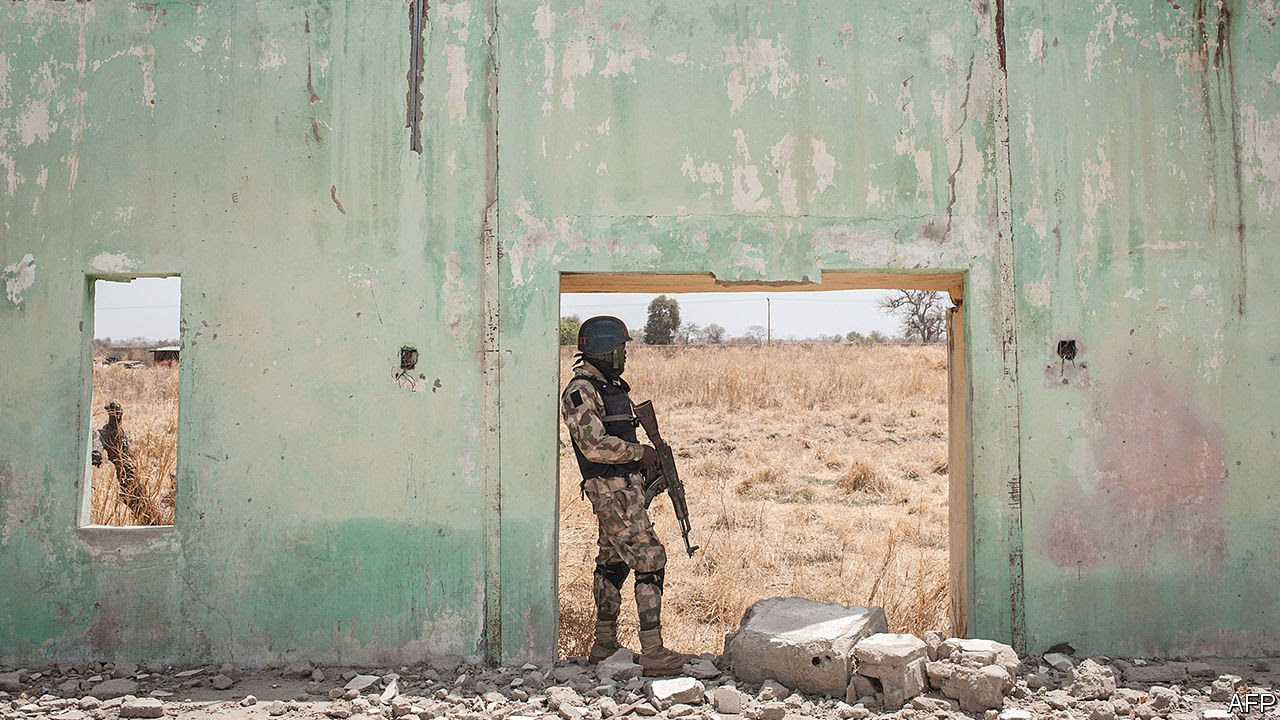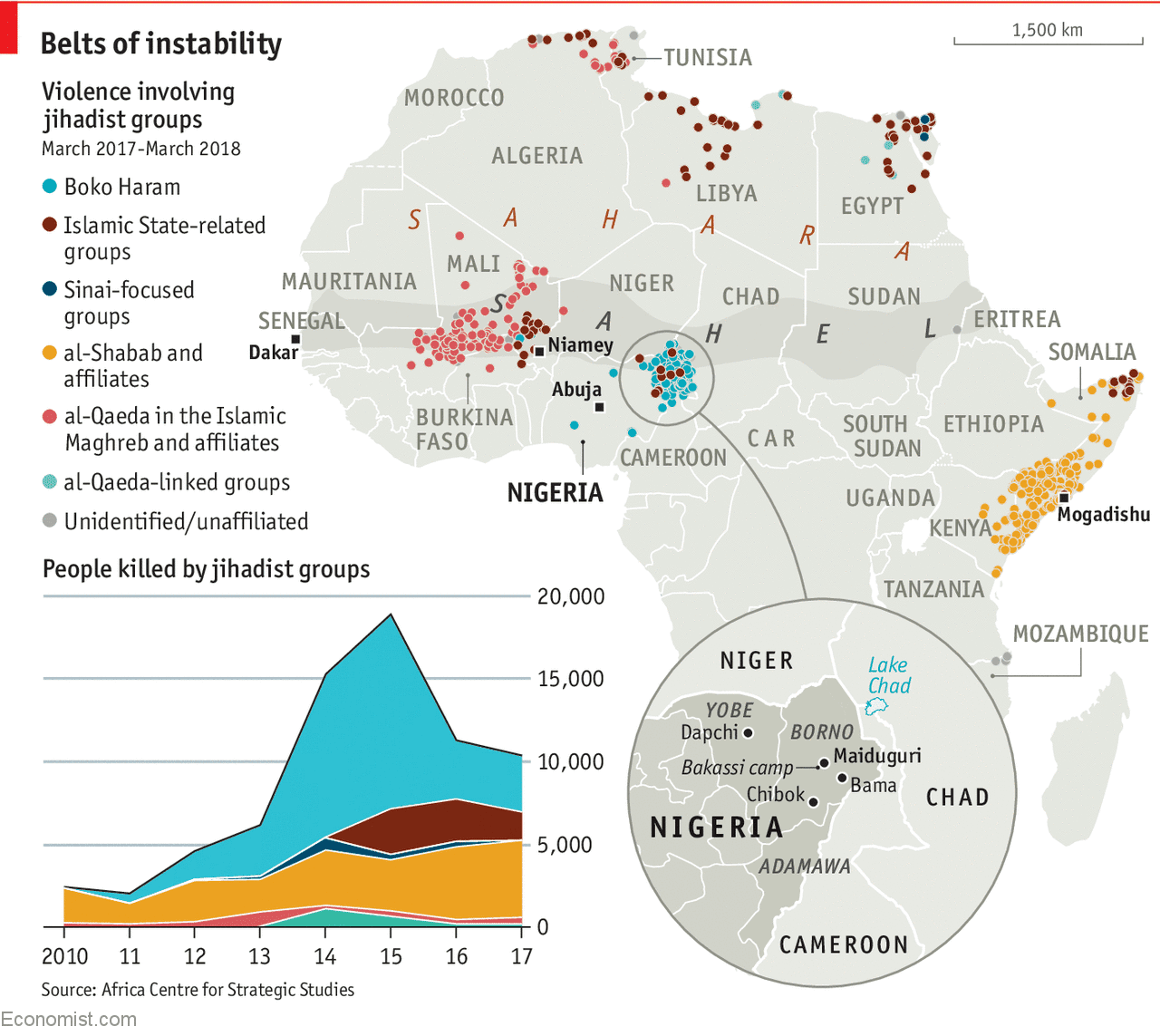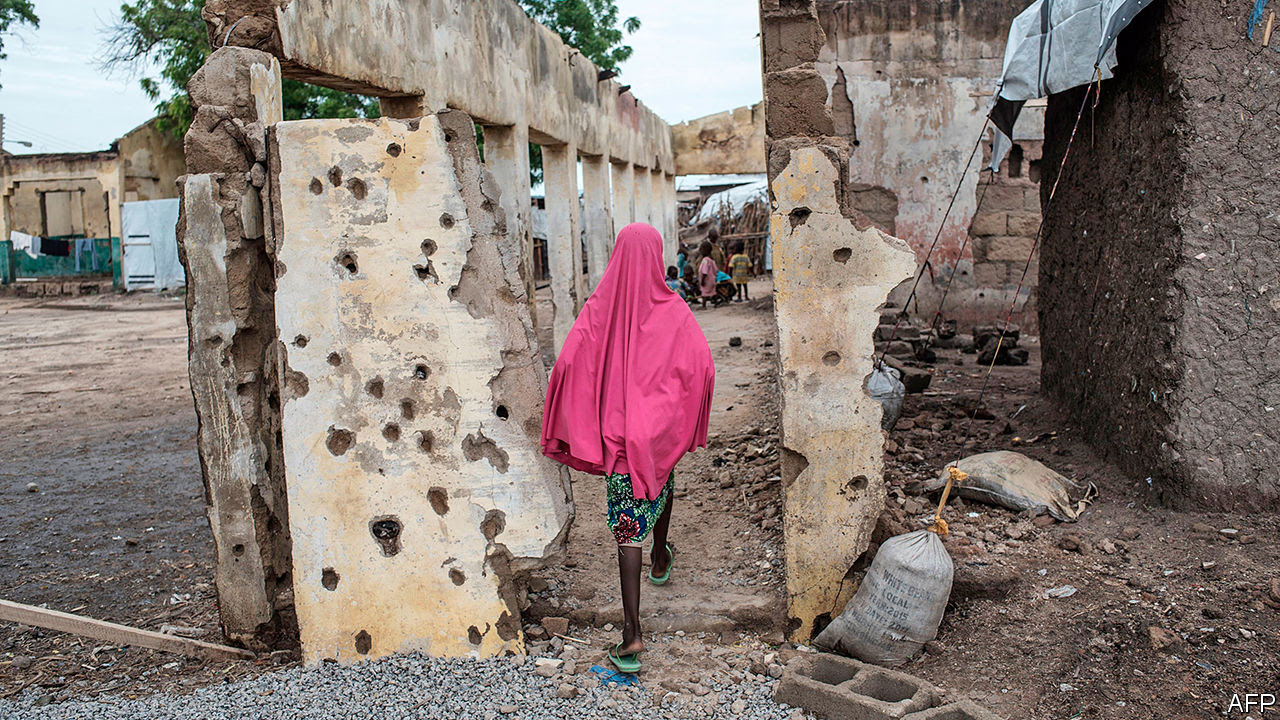The Economist
Violent Islamist groups are gaining strength in the Sahel. A report from Nigeria and Niger
THEIR hair tightly braided, two young girls sleep head-to-toe in matching pink dresses with gold trim—a sight to gladden the heart were it not for the startling white bandages around their arms and legs.
The beds in this ward are overflowing with patients, the rounded stumps of their amputated limbs pointing at the ceiling. Colour-coded tags hang near the door to sort casualties: red for the most urgent cases, black for those beyond help. They attest to the grim efficiency of the surgeons from the International Committee of the Red Cross (ICRC), gained from dealing with the unrelenting flow of bomb and gunshot victims. Their clinic is, perhaps, the only thing that works well in Maiduguri.
Nigeria’s main north-eastern city is at the centre of a series of jihadist campaigns stretching in two broad belts across Africa on either side of the Sahara. The northern one hugs the Mediterranean, from Egypt through Libya and Tunisia to Algeria. The southern one extends from Somalia and Kenya in the east through Nigeria and Niger and on to Mali, Burkina Faso and Senegal in the west (see map). Such vast distances separate the different battlefields, that Dakar, in Senegal, is almost as close to Miami as it is to Mogadishu in Somalia.
Get our daily newsletter
Upgrade your inbox and get our Daily Dispatch and Editor’s Picks.
Much of the conflict is barely reported on, even though last year it claimed more than 10,000 lives, almost all of them civilian. It also involves a battle against what General Mark Hicks, the commander of American special forces in Africa, calls “probably the largest card-carrying group” of Islamic State (IS) members outside Iraq and Syria. The war has drawn in troops from America, France, Britain and Germany, and is attracting remnants of IS.
African blues
Worryingly, it is a war that the jihadists seem to be winning. General Bruno Guibert, who commands the French counter-terrorism effort in the region, Operation Barkhane, which has about 4,500 troops, claims that the campaign is making significant progress: “I can’t say the situation is getting worse, actually it is getting better.” Yet the statistics suggest otherwise: the number of violent incidents involving jihadist groups in Africa has increased by more than 300% between 2010 and 2017; the number of African countries experiencing sustained militant activity has more than doubled to 12 over the period, according to the Africa Centre for Strategic Studies, which is part of America’s Defence Department. Many Western officers are despondent. Without more troops “there is no question we will lose”, says a senior French officer.
In the potpourri of jihadist groups, many pledge their loyalties to al-Qaeda or IS. They include al-Shabab in Somalia, Boko Haram and its factions in Nigeria, and Jama’a Nusrat al-Islam wal-Muslimin in Mali. In each country, conflict may be fuelled largely by local grievances. But the insurgents share some ideological traits. Many have been strengthened by the breakdown of Libya after the downfall of Muammar Qaddafi’s regime in 2011. Weapons spilled out of Libya’s armouries, and smuggling networks for everything from people to drugs developed across the Sahara. There are signs that the jihadists are learning from one another and sucking money and support from militant groups in the Middle East. Emmanuel Macron, France’s president, warned: “The challenge for us is to manage the conflicts … and stop them joining together.”
The most important of the battles is Nigeria’s campaign against Boko Haram. With a land mass about as big as France and Germany combined, Nigeria is Africa’s most populous country (with perhaps 180m people) and its biggest economy. If a country with such resources cannot contain the jihadist virus, what hope for Africa’s poorer and less capable states? A retired general who once held a senior post at AFRICOM, America’s military command for Africa, puts it thus: “If Nigeria goes down it would make a giant sinkhole that would suck in six or seven other countries.” Nigeria’s difficulties, moreover, offer sobering lessons to many other African countries, and their Western allies.
The Nigerian government insists that the war has already been won. “Boko Haram has been defeated,” says Tukur Buratai, Nigeria’s top-ranking general. Yet his assurance sounds hollow in the village of Kiribiri, about 20km (12 miles) from Maiduguri, where the limit of government-controlled territory is marked by a shallow ditch. A policeman points to the scrub beyond: “There is insecurity there,” he says. “That is Boko Haram’s.”
Maiduguri was the birthplace of Boko Haram, whose factions make up the world’s deadliest terrorist group. It is so extreme that it sickens even IS and al-Qaeda. The group was founded by the followers of a charismatic Islamic preacher, Mohammed Yusuf, who had started a religious school and mosque in Maiduguri in 2002. “He was very convincing,” says one man who attended Yusuf’s sermons as a police informer. “He made me agree with everything he said.”
Going Boko loco
Yusuf exhorted his followers to reject the state (since it is created by man, not God) and “any type of knowledge that contradicts Islam”, including such notions as the world being round or that rain comes from evaporation. Although Nigeria’s northern states have long enforced sharia, or Islamic law, their interpretation was not strict enough for Yusuf. Among his demands was a ban on secular schooling (the group’s name, Boko Haram, means “Western education is a sin” in Hausa).
By 2009 Yusuf’s men were attacking the police and army, and killing clerics who disagreed with his interpretation of Islam. The Nigerian police arrested and then killed Yusuf in front of a crowd outside the police headquarters in Maiduguri (the government insisted he was shot while trying to escape). Yusuf’s followers went into hiding before emerging under the command of Abubakar Shekau. In 2011 they blew up the headquarters of the Nigerian police and a UN building in Abuja, Nigeria’s capital. By the end of 2014 they had overrun large parts of three states in north-eastern Nigeria, gained international notoriety after kidnapping almost 300 schoolgirls from Chibok and were fighting their way into Maiduguri. Nigeria’s army, hollowed out by corruption, was in disarray. Units were filled by ghost soldiers whose pay was being pocketed by their commanders. One Western officer recalls how a company that should have had 100-150 soldiers consisted of just 20 men.
Unlike IS in Syria and Iraq, which established civil administrations to run its self-proclaimed caliphate, Boko Haram did not at first try to govern. It preferred chaos. It bombed mosques and markets, massacred villagers and abducted women and children. Some girls were enslaved and sold. Others were pressed into being human bombs. A study by the Combating Terrorism Centre at West Point, a military academy, found that more than half of 434 such human bombs the group used between April 2011 and June 2017 were female.UNICEF, the UN children’s agency, says that last year Boko Haram strapped bombs to at least 135 children.
Such wanton violence probably reflects the state of mind of Mr Shekau, an enigmatic figure known through videos of his rambling monologues. In one, he justifies selling into slavery the girls kidnapped in Chibok: “Allah says I should sell. He commands me to sell.” A man who attended his sermons says childhood acquaintances recall him as a recluse with an explosive temper. “Even when reciting the Koran, he shouts at the top of his voice,” he says. “He was very aggressive and abusive.”
Mr Shekau’s brutality proved too much even for IS, to which he had sworn allegiance in 2015, changing Boko Haram’s name to Islamic State West Africa Province (ISWAP). In 2016 IS named Abu Musab al-Barnawi the leader of ISWAP, splintering the group into two factions.
Meanwhile, thousands of villagers and residents of Maiduguri took up machetes or handmade muskets and joined a self-defence militia, the Civilian Joint Task Force (CJTF), that held the gates of the city. The new president of Nigeria, Muhammadu Buhari, a northerner and former military dictator, ordered his generals to move their headquarters to Maiduguri. Neighbouring states such as Chad, Niger and Cameroon contributed troops to a multinational force. Within months the army had recaptured most big towns, pushing the insurgents into forests or Lake Chad, a mass of swamps where the borders of four countries meet.
Since then, though, stalemate has set in. The army controls the main towns and some of the roads between them; insurgents hold sway over the countryside and villages. The Americans reckon that Mr Barnawi commands about 3,500 fighters (Mr Shekau probably has 1,500), meaning he may be in charge of the world’s largest IS force. There are thought to be only a few thousand IS men left in Syria and Iraq.
ISWAP has learned how to make roadside bombs and has become more skilled in conducting attacks. Many think it is getting training and advice from other jihadist groups, including IS. Foreign fighters are also being spotted among its ranks. “We see people from Mali, we see people from Libya,” says Abba Kalli, a commander of the 26,000-strong CJTF. Just how adept ISWAP had become was shown in February when its men mounted a long-distance raid to kidnap 110 schoolgirls from Dapchi, a town in neighbouring Yobe state. “They moved out about 250 miles to conduct a raid and retreat again,” says a Western officer. “That’s not something the Nigerian army is capable of doing.”
School? You must be joking
The army, although vastly more effective than it was in 2015, is overstretched and suffering from low morale. About half of its total infantry force of about 70,000 is deployed in the north-east. It does not give figures for its losses, but people familiar with the number say that more than 300 Nigerian soldiers were killed and 1,500 wounded last year. Having deployed such a high ratio of troops, it cannot rotate men or units out of the fight to rest and retrain. One special-forces soldier says he has been on operations constantly for four years. The emotional toll of this can be seen in the glazed, red eyes of one of his comrades, who looks back from a marijuana haze. Unlike the old Boko Haram, which did not bother to govern, ISWAP is consolidating control of border villages. It levies “taxes” on locals and erects roadblocks to extort money from passing traffic. ISWAP offers security and its own brand of justice in areas that have fallen beyond the control of the state. Although it cannot hold territory in a stand-up fight with the Nigerian army, it is building a proto-caliphate. “You can see the black flag [of IS] draped over huts in the villages,” says one army officer.
Nigeria’s generals talk about “winning hearts and minds” but they are doing the opposite. The army has systematically cleared people from the countryside, burning their villages and packing them into squalid camps in Maiduguri and other “garrison towns”. In all, some 2.4m people have been displaced by the fighting in Nigeria and neighbouring countries. The army argues that it is necessary to move people away from the fighting to protect them and to deny the jihadists food and shelter. “There are no innocent people in the bush,” says Mr Kalli of the CJTF.
Most observers think that indiscriminate killings by the army and the forcing of people into garrison towns are fuelling the insurgency. There are almost no jobs in the camps. Access is through checkpoints manned by the army and CJTF, who demand bribes. Amnesty International, a human-rights group, says many women and girls have been raped in the camps and that hundreds if not thousands of people confined in them have died of starvation or a lack of medical care. “It feeds right into the recruitment strategy of ISWAP, which is that the Nigerian government doesn’t give a shit about them,” says an aid worker. “It is like a factory for jihadis.”
The Nigerian state’s failure extends far beyond the camps. In areas affected by Boko Haram almost no one gets schooling, health care or other public services. In Bama, a town that was once home to more than 250,000 people, the general hospital is a camp for displaced people. Aid workers reckon that the Nigerian government has posted no more than two civilian administrators to the town. In effect, Nigeria’s north-east is a failed state within a dysfunctional one.
The UN Development Programme found that 71% of people who joined jihadist groups in Africa did so in response to brutality by the security forces. Most were uneducated and came from poor areas. What few services there are in the camps are provided by groups such as Médecins Sans Frontières (MSF) or the World Food Programme (WFP), which is helping to feed some 2m people. This is not enough. At an MSF clinic in Maiduguri, more than half of the beds are filled with stick-thin children, some with hair turned brittle and orange by starvation.
Yet, even amid the destitution, there are glimmers of economic development. In Bakassi, a large camp for displaced people, Hajja Kale Muhammad smiles broadly as she holds up a handbag stitched on a sewing machine bought with a grant from the ICRC. Mrs Muhammad fled Boko Haram with her four children three years ago. She now has a business that earns some 50,000 naira ($139) a week, a tidy sum in a country with a minimum wage of 18,000 naira a month. The ICRC, which last year devoted about 60% of its resources in northern Nigeria to providing emergency food aid, now allocates that share to development. The WFP, similarly, is trying to get farmers and fishermen back on their feet by giving them packs of seeds and fishing nets. This sort of work even has a new buzzword: the “triple nexus” of providing emergency aid, development assistance and security all at once in the hope that they will reinforce one another.
Notably absent is the Nigerian government. It published an impressive four-volume plan to rebuild the north-east two years ago, but has abdicated almost all humanitarian and development work to international organisations. “They’ve handed us the baby and now we’re stuck holding it,” says an aid worker.
Such lassitude worries Western armies, which are reluctant to get sucked into another war. America and Britain train Nigerian troops and provide advice and intelligence. American special forces also go on joint patrols with the army in Niger, and France conducts extensive operations across the Sahel. Western powers are bankrolling the G5, a regional counterterrorism force with troops from Burkina Faso, Chad, Mali, Mauritania and Niger.
But they are loth to take a more direct role in fighting ISWAP in Nigeria, such as that being undertaken in Somalia, where America has some 500 troops on the ground and conducts raids and drone strikes to kill or capture jihadists. (It lost a soldier in June.) This is partly because, for now at least, ISWAP poses little direct threat to Western countries. Lake Chad is inaccessible, so few foreign fighters can get in or out. It is also horribly poor, and therefore unattractive to the Western-born jihadists who complained that life in Iraq and Syria lacked material comforts. Other jihadist outfits in the region have proved able to attack Western targets locally, such as hotels. But only IS in Libya has successfully staged attacks in Europe in recent years.
The death of four American soldiers in an ambush in Niger last October is already raising doubts about the scale of America’s involvement in Africa. That incident was America’s biggest loss of lives in combat in Africa since 18 men were killed in Mogadishu 25 years ago, which prompted the withdrawal of its forces.
A similar rethink may be taking place after the ambush in Niger. American soldiers in Africa have been ordered to go on fewer missions and to take fewer risks. Earlier this year the Pentagon told AFRICOM to plan for a possible 50% cut in the number of special forces in Africa over three years. To fill that gap, Britain, France and their allies would have to put more of their troops on the ground.
A line in the sand
Some think that, far from cutting back the military effort, it needs to be stepped up. A Western air campaign could inflict heavy casualties and knock back ISWAP’s ability to organise by a year or more. But air strikes alone would probably not be enough to defeat the group. “We could knock out the leadership, but would that make things any better?” asks one British officer. Western officers talk of the need for a long-term commitment to train, equip and assist local forces, and to give them air support when needed.
General Hicks compares the rise of jihadism in Africa to that of the Taliban in Afghanistan in 1993. The threats they pose to the West “are still in a nascent stage and can be dealt with at a price that’s affordable in both blood and treasure,” he says. Leaving the danger to fester might allow the threat to grow until Western forces are compelled to intervene directly and massively. But the experience of the West in Afghanistan since 2001 holds another lesson: military intervention alone cannot solve the problem. It can disrupt jihadists and buy time to win back the allegiance of the disgruntled and marginalised. For the most part, that is a job for Africa’s beleaguered rulers—if they are up to it.
Dig deeper
Transcript: Interview with General Hicks
This article appeared in the Middle East and Africa section of the print edition under the headline “Jihad’s next battleground”










